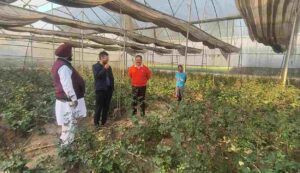Success Story: This farmer from Haridwar earns 10 lakh rupees annually by cultivating organic roses
Success Story: Lakhbir Singh is planting not just seeds but also dreams for a more sustainable and florally bright future in the holy setting of Haridwar, Uttarakhand. Lakhbir has a strong academic background and could have pursued a variety of traditional professional options. He holds a postgraduate diploma in rural development, a master’s degree in social science, and a postgraduate degree in economics. However, his path has been defined by the land, his lineage, and the allure of farming.

He received the ancestral land and an unwavering attachment to agriculture from his family, who were traditional rice and wheat growers. Lakhbir Singh, however, went beyond convention and rethought it.
A Revolution in Floriculture
Lakhbir Singh bravely switched from traditional grain farming to floriculture, with a particular emphasis on roses, around seven years ago. Who inspired him? Haridwar, also known as Dev Bhoomi, the Land of the Gods, is a religious and cultural place where flowers are deeply ingrained in the celebration and spiritual fabric of life. Flowers, particularly roses, have great emotional and commercial importance, whether they are donated in Ganges River ceremonies or are arranged in bouquets for festivals and family gatherings.
Lakhbir focused on growing a kind of rose that was especially suitable for producing bouquets after seeing this steady demand. His rose collection is a visual feast, with traits including robust stems, vivid colors, extended shelf life, and excellent keeping quality.
Upon entering his polyhouse, you are welcomed by rows of vibrant reds, delicate pinks, sophisticated whites, and upbeat yellows—a meticulously arranged kaleidoscope of flower perfection. Demand for these flowers is always strong, particularly during the tourist and wedding seasons, and they are mostly sold in the busy marketplaces of Haridwar, Rishikesh, and Dehradun.
Protected Cultivation’s Contribution to Floral Excellence
Although it may seem romantic, growing roses is a delicate business that is fraught with difficulties. Delicate flower crops may suffer from the harsh winters, excessive rains, and erratic temperature swings that characterize mountainous regions like Uttarakhand. Due to their extreme sensitivity, roses are vulnerable to physical harm from inclement weather, fungal infections, and insect infestations.
Protected farming, which involves growing crops in controlled conditions like polyhouses, was Lakhbir’s answer. Temperature, humidity, and light exposure can all be controlled in the structure’s perfect microclimate. In addition to reducing the likelihood of illnesses and insect infestations, this enables year-round production, guaranteeing a steady supply for the market. Protected agriculture has helped Lakhbir retain stability in his output and revenue while also greatly enhancing bloom quality and lowering crop losses.
Using Organic Inputs to Transform Waste into Wealth
Lakhbir Singh’s choice to switch to organic farming methods was one of the major turning points in his development as a forward-thinking farmer. He started creating his own organic fertilizers on the farm after seeing the long-term harm that chemical pesticides and fertilizers were doing to the land and to people’s health.
Lakhbir created a powerful compost combination that restores soil fertility and promotes healthy plant development using dried leaves, cow manure, cow pee, and leftover rose cuttings. In addition to improving soil microbial activity, this homemade compost also helps drastically reduce input expenditures. As natural repellents against common pests and fungal illnesses, he has also included crushed neem kernels and neem oil in his pest control techniques. His rose farm is now a low-input, high-efficiency model that balances sustainability and profitability thanks to these environmentally friendly methods.
Establishing a Farmer Collective
The scope of Lakhbir Singh’s goal goes beyond his own acreage. He recently led the establishment of Nav Gurukul, a Farmer Producer Organization (FPO), motivated by a love for community-based development. 450 farmers from the surrounding regions have already joined the effort, which is still in its early phases. The majority of members work in agriculture and animal husbandry.
Lakhbir hopes to establish a common platform for information sharing, resource pooling, and group marketing via Nav Gurukul. Simplifying the manufacturing and delivery of dairy products is one of the FPO’s main goals. In the next few years, Lakhbir intends to use this network to create a strong system for the purchase and sale of milk, giving participating farmers a reliable and extra source of revenue.
Additionally, the FPO seeks to make government programs, agricultural equipment, and financial financing more accessible—services that small and marginal farmers who work alone sometimes cannot afford. The members may negotiate better pricing for their goods and take advantage of economies of scale by cooperating under a formal organization.
Plans for Growth
Even though Lakhbir Singh’s rose farm is still doing well, he is not sitting back and enjoying himself. The next stage of diversification is already in his sights. There are plans to turn another two acres of his acreage into vegetable farms. Vegetables have a high turnover rate, shorter crop cycles, and steady demand in both urban and rural markets, making this a smart choice.
Lakhbir thinks combining floriculture and vegetable gardening would enable him to have stable revenue streams all year long since he already has the infrastructure and expertise in place. His background in pest control and organic composting will be a perfect fit for this new vertical, guaranteeing a high-quality product free of chemical residues.
Economic Impact
Although numbers vary periodically, Lakhbir Singh has made a substantial profit from growing roses under protection. He has been able to charge top dollar for his flowers because he has a steady clientele in important cities like Haridwar, Rishikesh, and Dehradun and prioritizes quality above quantity. He makes 10 lakhs a year from floriculture alone. Lakhbir has created a paradigm that is both highly lucrative and ecologically sustainable by optimizing production via climate-controlled polyhouses and decreasing input costs through in-house organic composting.
The Governor of Uttarakhand honored Lakhbir Singh in 2024 for his outstanding contributions to sustainable farming and horticulture, a distinction that underscores his increasing clout in the agriculture industry. He has also gained a significant position in the Global Farmer Business Network (GFBN), where he is recognized as a vital resource and an inspiration to other farmers nationwide for his creative methods and community-oriented philosophy.
His revenue is expected to increase further as he aims to extend his operations into dairy production and vegetable gardening under the Nav Gurukul FPO. More significantly, his work is improving the lives of hundreds of small and marginal farmers who have joined his farmer producer association, opening the door for shared wealth.
The tale of Lakhbir Singh is not only one of a prosperous floriculturist. It tells the story of a visionary who is revolutionizing farming in Uttarakhand’s hill country. He is creating a new paradigm that gives equal weight to environment, economics, and empowerment by fusing ancient knowledge with contemporary farming methods and encouraging community cooperation via Nav Gurukul FPO.
The idea of resilient, community-driven agriculture blossoms, much as roses flourish beneath the cover of his polyhouses. Lakhbir Singh is a living example of what can be achieved when one has the courage to go beyond the apparent and nurtures not just crops but also peace, hope, and overall development.

